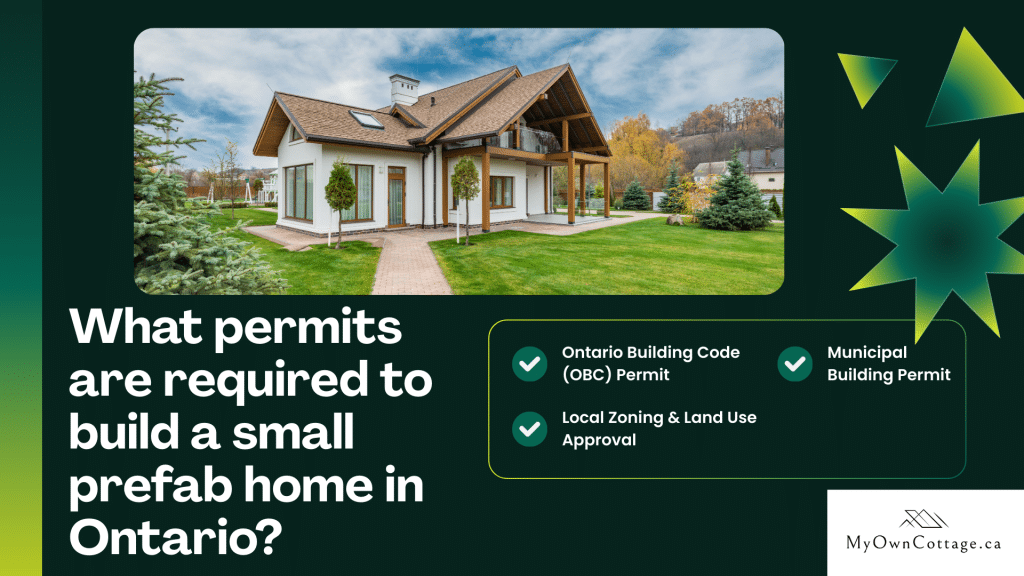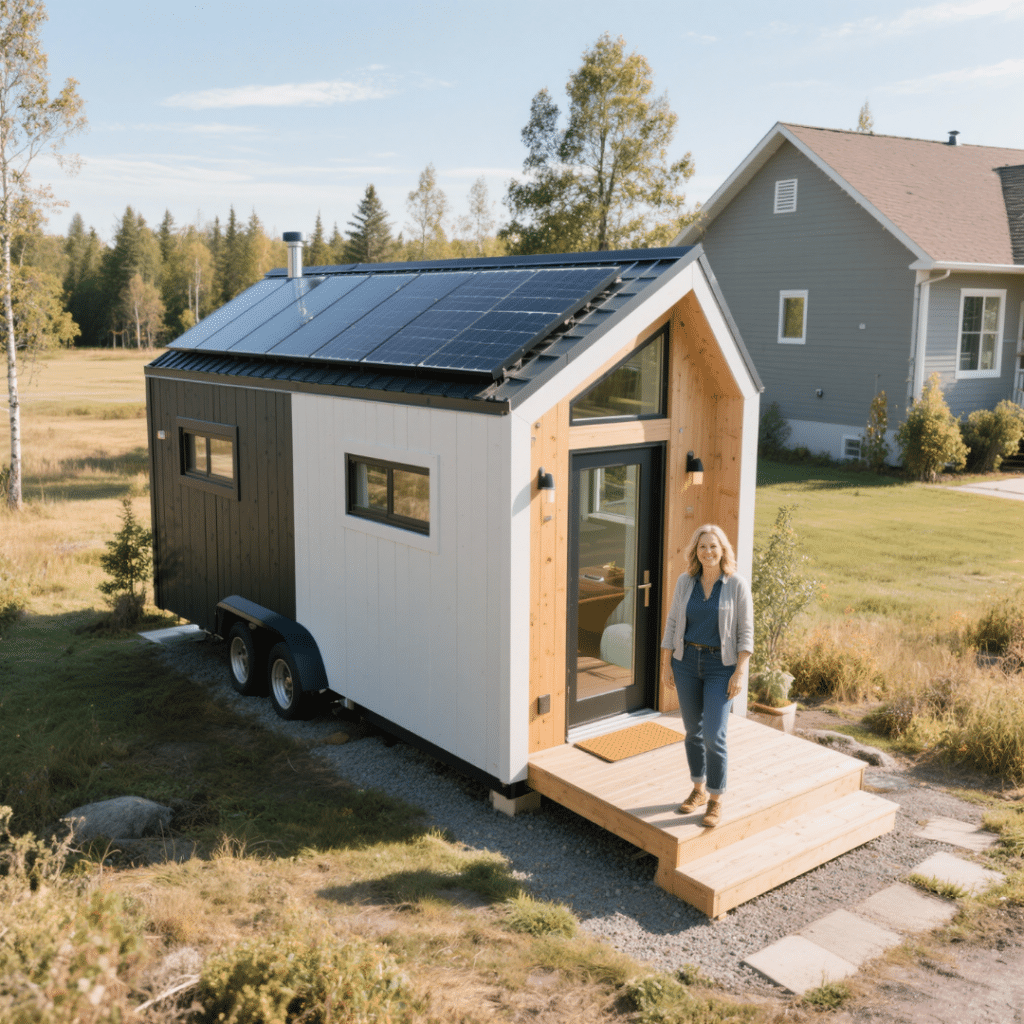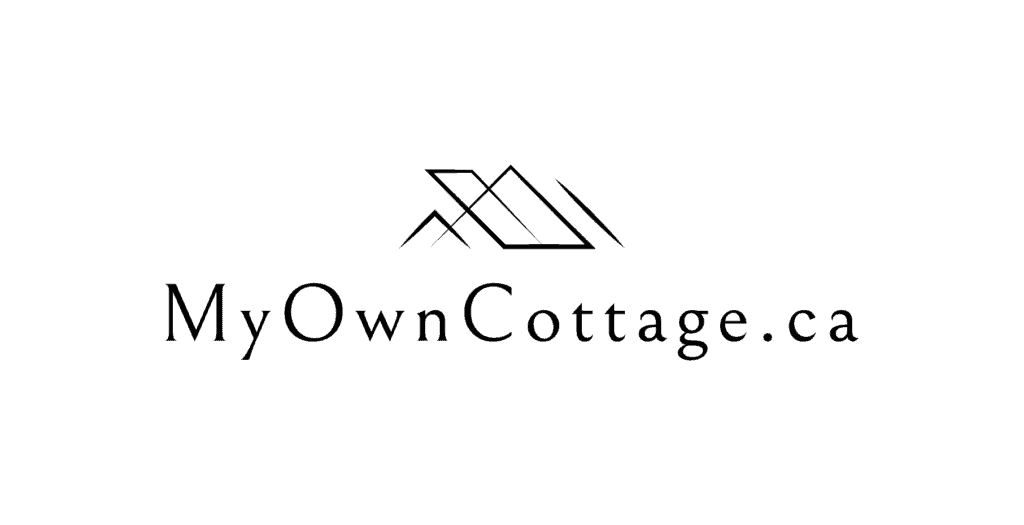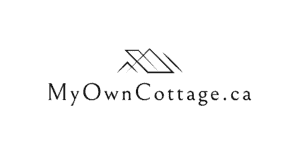Ontario's Small Prefab Home Permits: What You Need to Know
📅 Last updated: September 18th, 2025
✍️ Written by prefab building specialists at My Own Cottage
To build a small prefab home in Ontario, you’ll need permits for zoning, construction, and in many cases, utilities. The exact requirements depend on your municipality.
This guide walks you through the approval process, estimated costs, and common mistakes to avoid—so you can plan your prefab home project with confidence.

Building a small prefab home in Ontario can be an affordable and energy-efficient way to achieve homeownership.
Before starting construction, it’s important to understand the permit requirements set by your local municipality.
Knowing which approvals apply in your area will help you avoid costly delays and ensure your project meets Ontario’s building standards.
👉 If you’re researching permits as part of your homebuying journey, make sure to also explore Small Prefab Homes in Ontario for Sale.
Do You Really Need a Permit for a Small Prefab Home in Ontario?
The short answer: yes—you need a building permit for a prefab home in Ontario, just as you would for a traditional stick-built house.
Under the Ontario Building Code (OBC), every dwelling must meet structural, safety, plumbing, and energy-efficiency standards before construction can begin.
Prefab homes—also known as modular homes—are factory-built but still require on-site inspections during assembly to ensure compliance.
Municipal building inspectors must confirm compliance with the Ontario Building Code (OBC) before you can legally move in.
Key Points to Know
Prefab vs. modular homes: Both types of factory-built housing require building permits.
Tiny homes: Must comply with local zoning bylaws and meet the OBC’s minimum dwelling size requirements.
Backyard units (ADUs): Increasingly popular, but they must follow municipal zoning rules for secondary or garden suites.

Beyond efficiency, demand has been rising rapidly across the province. To understand this trend, explore why are small prefab homes becoming popular in Ontario?
Alternatively, book a free consultation with us to get the assistance you need for your homebuilding project.
📄 Key Permits Required for Small Prefab Homes in Ontario
Zoning and Land Use Approvals
Before applying for a building permit, check your municipality’s zoning bylaws for prefab homes. Local zoning rules typically address:
Minimum lot size requirements
Setback distances from property lines
Land use designations (residential, agricultural, cottage, etc.)
⚠️ Example: Placing a prefab home on agricultural or rural land in Ontario may require special approvals. In larger cities like Toronto or Ottawa, stricter urban bylaws often apply.
For details on property types and restrictions, see our guide: can you put a small prefab home on any type of property in Ontario?
Building Permits
A building permit confirms that your prefab home complies with the Ontario Building Code (OBC). This usually includes:
Structural safety approvals
Plumbing and electrical inspections
Foundation and installation permits
Even if your prefab home is CSA-certified and inspected at the factory, final on-site assembly always requires a municipal inspection.
Septic & Utility Permits
If you’re building on rural land without municipal services, you may also need:
Septic system permits
Hydro and water connection approvals
Off-grid compliance (for solar, wells, or alternative utilities)
Other Local Permits & Inspections
Depending on your property’s location and designation, additional approvals may include:
Driveway access permits
Heritage or conservation authority approvals
Local by-law permits for ADUs, cottages, or granny flats
📜 Ontario Laws & Building Code References
When building a prefab home in Ontario, it’s essential to understand which codes and standards apply. Below are the most important ones, with references to official government and certification sources.
🧱 Ontario Building Code (OBC)
The Ontario Building Code (OBC) sets minimum construction standards for all residential buildings, including prefab and modular homes. It governs safety, structural integrity, plumbing, and energy-efficiency requirements.
🗺️ Ontario Zoning By-law Information
Ontario’s zoning by-laws regulate how land can be used in each municipality. They determine where prefab homes are permitted, along with minimum lot sizes and setback requirements. Always review your local zoning rules before applying for a permit.
✅ CSA A277 Certification (Prefab & Modular Compliance)
The CSA A277 national standard confirms that factory-built prefab modules meet strict quality and safety requirements before delivery. However, even CSA-certified homes require final municipal inspections under the OBC once installed on-site.
📌 Why This Matters
Understanding these codes from the start helps homeowners, builders, and inspectors stay aligned on compliance. Referencing official standards and regulations builds trust, ensures transparency, and helps keep your prefab home project safe and legal.
⏳ How Long Does It Take to Get a Prefab Home Permit in Ontario?
Permit timelines vary by municipality, but most prefab home building permit applications in Ontario take 2 to 8 weeks to process—provided all required paperwork and plans are complete.
To better plan your timeline, you may want to explore how long it takes to order and receive a small prefab home in Ontario.
Speed Up Your Application
If you want to shorten prefab home permit approval timelines in Ontario, these strategies can help:
Work with an experienced prefab home builder who understands your municipality’s process.
Submit stamped engineer drawings along with a complete Prefab Home Permit Checklist for Ontario.
Apply online if your municipality offers a digital permit system.
💡 Real-world example: A homeowner in Ottawa received approval in just 21 days by working with a licensed prefab consultant who pre-checked zoning and Ontario Building Code compliance before submission.

In addition to zoning checks, your prefab design can be tailored to your needs.
If you’re curious about design flexibility, read more about how small prefab homes be customized in Ontario.
💰 Costs of Prefab Home Permits in Ontario
| Permit Type | Estimated Cost Range |
|---|---|
| Building Permit | $1,000 – $3,000 |
| Septic/Utility Permits | $500 – $2,000 |
| Development Charges | Varies widely ($0 – $10,000+) |
👉 Hidden Costs to Watch For
Small prefab homes can be sold move-in ready or as kits in Ontario.
When budgeting for a prefab home in Ontario, remember that permit fees are only one part of the total cost. Additional expenses may include:
Engineering fees – for stamped drawings or structural modifications.
Development levies – charged by some municipalities to support local infrastructure.
Utility hookup charges – for connecting hydro, water, or gas to your property.
Inspection rescheduling fees – if work is non-compliant or inspectors need to return.
❌ Common Mistakes That Delay Prefab Home Permits
Even experienced homeowners can run into setbacks during the prefab home permit process in Ontario. The most frequent issues include:
Submitting incomplete applications – Missing documents or drawings can delay approval for weeks.
Overlooking local zoning by-laws – Lot size, setbacks, and land-use restrictions are common stumbling blocks.
Hiring unlicensed builders or unverified prefab suppliers – This can result in compliance issues or permit rejections.
Misclassifying a prefab as a mobile home – Mobile homes follow different standards and regulations in Ontario.
📊 Real-World Case Study: From Permit to Keys in Just 3 Weeks
Real Experience: Prefab Tiny Home in Sudbury, Ontario
🧑🔧 Homeowner: Susan H.
📍 Location: Sudbury, ON
🏡 Project Type: 300 sq. ft. prefab tiny home (secondary dwelling unit / ADU) on rural residential land
⚠️ Challenge: Navigating zoning bylaws for a tiny home on a shared lot with an existing main dwelling
📋 The Permit Process
Worked with My Own Cottage’s in-house designer to create stamped BCIN drawings tailored for ADU compliance.
Completed a zoning pre-check with the City of Greater Sudbury before submission.
Submitted a complete permit package, including:
CSA A277 compliance documents
Energy efficiency forms
Site plans
⏱️ Timeline & Outcome
Application Submitted: May 5, 2025
Permit Approved: May 26, 2025 (21 days later)
Inspections Completed: June–July 2025
Occupancy Granted: August 3, 2025
✅ Today, Susan enjoys a modern, off-grid certified tiny home.
Based on her specifications, it came with a composting toilet, solar panels, and radiant floor heating.

💬 What Susan Says
“I thought permitting would be the hardest part, but My Own Cottage made it painless. They knew the exact forms Sudbury needed and even scheduled my inspections. From the first consultation to move-in, everything felt handled.”
👉 Learn more about small prefab homes in Ontario for sale to see listings that already meet code compliance.
Final Steps: From Permit Approval to Building Your Prefab Home
Once your permits are approved, you can move on to site preparation and installation. At this stage, most Ontario homeowners will:
Work with licensed prefab builders to ensure proper assembly and full compliance.
Schedule required inspections with municipal building officers.
Finalize utility hookups and occupancy permits before moving in.
✅ Ready to Start Your Prefab Home Journey?
Take the first step toward your small prefab home in Ontario today!
🧑💼 Request a Free Consultation
📲 Call Us Directly: (705) 345-9337
🏘️ View Our Design Catalogue
✅ Ontario-Built | ⚡ Energy-Efficient | 🏡 Fully Customizable | 🚚 Fast Delivery
Alternatively, for your convenience, you can also simply fill out the contact form below and we’ll get back to you soon! 👇
Contact Us
We usually respond within 24 hours!
- Comprehensive Warranty
- Best Price Guarantee
- Exceptional Service
Disclaimer
This article provides general guidance on Ontario prefab home building permits. Requirements vary by municipality. Always confirm with your local building department or consult with a certified builder, architect, or zoning lawyer before beginning construction.
FAQ: About Ontario Small Prefab Home Building Permits
What permits are required to build a small prefab home in Ontario?
To build a small prefab home in Ontario, you need a building permit from the local municipality. The design must meet the Ontario Building Code (OBC) and local zoning by-laws. You’ll also need inspections during site prep, foundation, module installation, and final occupancy.
Do you need a building permit for a prefab home in Ontario?
Yes. All prefab or modular homes in Ontario require a building permit, just like traditional homes. This ensures compliance with the Ontario Building Code and local zoning rules.
What documents or drawings are needed to apply for a prefab home permit?
You must submit detailed construction drawings (foundation, structure, plumbing, electrical), site plans, and documentation from a licensed designer, architect, or engineer. If modules are factory-built, you’ll also need proof of any factory certification (e.g. CSA A277) and quality control records.
How long does it take to get a prefab home permit in Ontario?
Permit processing time varies by municipality but typically ranges from 2 to 8 weeks when all required documents are complete and in order. Early engagement with local officials and a well-prepared application can speed things up.
How much does a prefab home building permit cost in Ontario?
Costs depend on municipality, project size, and scope (foundation, electrical, plumbing, etc.). Basic building permits might cost from around $1,000 upward, with additional fees for utilities, zoning approvals, or inspections.
Are factory-built modules required to have CSA certification in Ontario?
Yes or very strongly recommended. Factory-built prefab modules should comply with CSA A277 certification (for factory certification of modules and panels) or other applicable CSA standards to meet building code and give municipalities confidence in safety, quality, and compliance.
Do small prefab homes (tiny homes) have minimum size requirements under the Ontario Building Code?
Yes. The OBC includes minimum size thresholds for habitable spaces—e.g. 17.5 m² (188 ft²) for tiny homes. Homes smaller than that may not qualify under certain building or minimum dwelling standards.
Can you build a prefab home on agricultural or rural land in Ontario?
Yes, but several conditions apply. You must ensure your proposed property zoning allows residential prefab use, and you may require additional utility, septic, or environmental approvals. If local zoning laws restrict residential structures in agricultural zones, a zoning approval or variance will be needed.
What inspections are required during and after prefab home installation in Ontario?
The inspections vary but generally include factory inspection of modules (if applicable), foundation, framing, plumbing, electrical services, anchorage/foundation anchoring, grading, and final occupancy. Municipal inspectors must confirm each stage meets the approved plans and the Ontario Building Code.
Is there a prefab home builder that can help me with my permitting needs?
Yes. My Own Cottage is a trusted prefab home builder in Ontario that also assists with the permitting process. Their team helps homeowners navigate local zoning, building code compliance, and municipal approvals to make building a prefab home simple and stress-free.
🛡️ Verified Third-Party Resources
For added confidence and transparency, here are trusted external sources that support modular homebuilding in Ontario:
Ontario Building Code (O. Reg. 332/12)
Official provincial regulations that govern modular and factory-built homes.Tarion Warranty Corporation
Provides home warranty coverage and builder licensing in Ontario.Canadian Home Builders’ Association (CHBA)
National organization supporting residential construction, modular certification, and best practices.CMHC – Canada Mortgage and Housing Corporation
Federal housing authority offering insights on modular housing affordability, financing, and energy efficiency.Statistics Canada: Housing Data
Data-driven research on Canadian housing trends, ownership, affordability, and construction.

